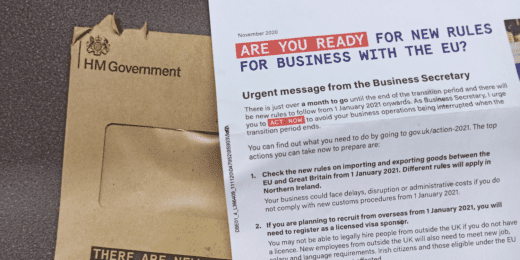Large firms sitting on payments to their smaller counterparts has long been a problem in the UK, with current figures suggesting that £23.4 billion is currently owed in outstanding invoices. Fortunately, the government is now taking action on this “intolerable” practice by launching a review.
The Payment and Cash Flow review
Announced at Small Business Saturday (on its 10th anniversary) by Business Secretary Grant Shapps, the Payment and Cash Flow review aims to “scrutinise existing practices and measures, and the progress in combatting late payment, to ensure that the UK has the right arrangements in place to best support small businesses.”
Small business owners in the UK will be all too familiar with the routine chasing-up of late payments, wasting large amounts of time and effort continuously requesting what they are owed. This is a drain on resources and can be remarkably stressful, especially for businesses on tight budgets.
The review aims to curb late payment
Business Secretary Grant Shapps: “The UK’s 5.5 million small businesses are an integral part not just of our economy, but of our communities too, and this government is firmly on their side.”
“That many small firms are routinely paid late is intolerable and presents a real barrier to productivity, the creation of high-skilled jobs and ultimately economic growth.”
“This review will allow us to build on the success we have had so far in curbing late payment, unshackling small businesses from this exploitative practice and creating a system that is fit for the future. While we crack on with this work, I also want to remind big businesses of their duty to ensure their smaller suppliers are paid promptly.”
The Procurement Bill
The government is attempting to show the way forward via The Procurement Bill – currently being debated in Parliament – in which they have set out the requirement for “30 day payment terms to apply in public sector supply chains”.
The goal of this particular legislation is to motivate smaller businesses to bid for public sector contracts.
Prompt Payment Code
This isn’t the first time that the significant issue of late payment has drawn focus. In 2021, the Small Business Commissioner relaunched the Prompt Payment Code (PPC), which demands that larger businesses pay 95% of their smaller suppliers within 30 days.
Entities of GlaxoSmithKline drew particular criticism in 2019, when it was found that they failed to meet the necessary payment requirements of paying 90% of suppliers within 60 days. This led to them being suspended from the Prompt Payment Code. Only when they overhauled their payment practices were they reinstated.
Whilst this is certainly a success story for the code, the big stumbling block is that signing up for it is not a legal obligation.
The significance of the late payment problem
The number of businesses affected by late payment cannot be underestimated, with research showing that “half of invoices issued by small business are paid late”.
To give this some context, at the start of 2022, 99.2% of the UK’s total business population was considered a small business, i.e. one that has 0-49 employees.
Small business owners will no doubt welcome this newly announced Payment and Cash Flow review, which will be led by the Minister for Enterprise, Markets and Small Business.
We’ll be sure to keep you updated with the latest developments.
Tell us your late payment stories
Now we want to hear about your experiences.
Without naming names, tell us if your business has ever fallen victim to late payment or even non-payment, and what – if anything – you did about this. Get in touch with a comment.
Thank you for taking the time to read this post. If you would like to read more posts like this, take a look at our central blog page.
Please note that the information provided in this article is for general informational purposes only and does not constitute legal, tax, or professional advice. While our aim is that the content is accurate and up to date, it should not be relied upon as a substitute for tailored advice from qualified professionals. We strongly recommend that you seek independent legal and tax advice specific to your circumstances before acting on any information contained in this article. We accept no responsibility or liability for any loss or damage that may result from your reliance on the information provided in this article. Use of the information contained in this article is entirely at your own risk.








Join The Discussion